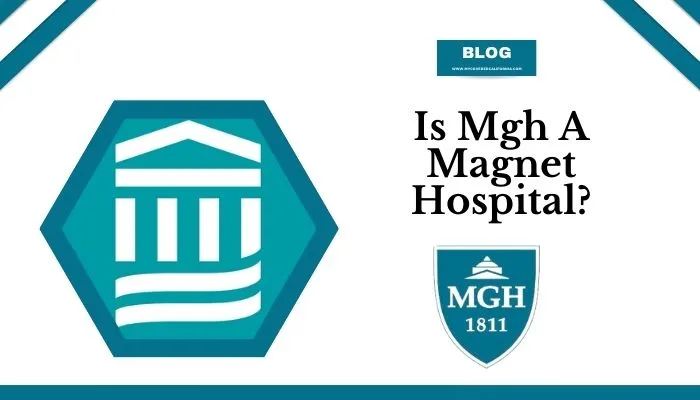Is Mgh A Magnet Hospital? The healthcare landscape thrives on a foundation of dedicated professionals, and nurses play a pivotal role in ensuring patient well-being.
Magnet Hospitals, designated by the American Nurses Credentialing Center (ANCC), represent the pinnacle of nursing excellence. These institutions are recognized for fostering an environment that empowers nurses, promotes quality care, and ultimately, leads to better patient outcomes.
Let’s delve deeper into the world of Magnet Hospitals, exploring their significance, the criteria for recognition, and the rich history of the Magnet Recognition Program.

Is Mgh A Magnet Hospital?
Magnet Hospitals prioritize building a strong nursing workforce. This translates to better nurse-to-patient ratios, improved communication, and a higher level of patient satisfaction.
These institutions invest in their nurses’ professional development through continuing education programs, leadership opportunities, and a supportive work environment. This fosters job satisfaction, reduces burnout, and attracts top talent.
Magnet Hospitals encourage a culture of research and evidence-based practice. Nurses are actively involved in quality improvement initiatives, leading to better clinical outcomes and a constant push for improved healthcare delivery.
Introducing Massachusetts General Hospital (MGH)
MGH, a world-renowned teaching hospital affiliated with Harvard Medical School, consistently ranks among the top healthcare institutions in the nation. They have achieved Magnet Recognition, a testament to their commitment to nursing excellence. Their success story exemplifies the positive impact Magnet designation can have on a healthcare facility.
Demystifying Magnet Hospitals: What Makes Them Special? A Magnet Hospital, as designated by the ANCC, is a healthcare organization that demonstrates excellence in nursing through its practices, leadership strategies, and work environment.
The Magnet Criteria for Success
The ANCC outlines five core components that Magnet hospitals must demonstrate:
| Area | Description |
|---|---|
| Vision | A clear vision for nursing excellence that aligns with the overall organizational goals. |
| Structural Empowerment | A supportive structure that empowers nurses to participate in decision-making and shape patient care delivery. |
| Models of Excellence | Implementation of best practices in nursing, including evidence-based care and innovation. |
| Outcomes | Measurable results that demonstrate improved patient care, nurse satisfaction, and retention rates. |
| Continuous Improvement | A culture that fosters ongoing evaluation, research, and refinement of nursing practices. |
The Rewards of Magnet Recognition
Magnet designation is not just an honor; it comes with a multitude of benefits:
Magnet Hospitals become magnets (pun intended) for highly skilled and experienced nurses, leading to a stronger workforce. Improved nurse-to-patient ratios, better communication, and a focus on evidence-based care all contribute to higher patient satisfaction scores.
Magnet designation signifies an institution’s commitment to nursing excellence, enhancing its reputation and public image within the healthcare community.
The History of Magnet Recognition
Origins: The Magnet Recognition Program was established in 1990 by the American Nurses Association (ANA), based on research that identified 14 key characteristics of healthcare organizations excelling in nurse recruitment and retention.
Evolution of the Program: Over the years, the Magnet criteria have been updated to reflect the ever-changing landscape of healthcare. The current iteration, Magnet 2020, emphasizes the importance of a global perspective, leadership development, and creating an environment conducive to optimal nursing practice.
The Impact of Magnet Recognition: The Magnet Recognition Program has significantly influenced nursing excellence across the globe. Research shows that Magnet hospitals have:
Higher percentages of satisfied nurses | Lower nurse turnover rates | Improved patient outcomes.
MGH’s Path to Magnet Recognition
Magnet Recognition isn’t bestowed lightly. The ANCC conducts a rigorous evaluation process, meticulously reviewing an applicant hospital’s practices, leadership strategies, and work environment. MGH’s journey likely involved the following:
A detailed application outlining MGH’s commitment to the five Magnet criteria would have been submitted. This elaborate document would showcase the hospital’s:
| Area | Description |
|---|---|
| Vision for Nursing Excellence | How MGH envisions the role of nurses within the institution and how it aligns with their overall goals. |
| Structural Empowerment | Demonstration of a supportive structure that empowers nurses to participate in decision-making and shape patient care delivery. This could include shared governance models, unit-based councils, and robust communication channels. |
| Models of Excellence | Evidence of best practices in nursing, including innovative approaches to patient care, implementation of evidence-based protocols, and a commitment to professional development for nurses. |
| Outcomes | Measurable results that demonstrate improved patient outcomes, nurse satisfaction, and retention rates. This might involve data on patient satisfaction surveys, nurse turnover rates, and positive patient outcomes directly linked to nursing interventions. |
| Continuous Improvement | Documentation of a culture that fosters ongoing evaluation, research, and refinement of nursing practices. This could include participation in quality improvement initiatives, research projects led by nurses, and a commitment to staying abreast of the latest advancements in nursing practice. |
Magnet Recognition Bestowed Following a successful application and site visit, MGH would receive the coveted Magnet designation, signifying its achievement of excellence in nursing.
Examining MGH’s Magnet Status
MGH’s Magnet designation isn’t just a badge of honor; it’s a testament to the hospital’s commitment to its nurses and patient care. Here’s how MGH might demonstrate its Magnet status:
- Nurse Satisfaction Surveys: High nurse satisfaction scores can indicate a supportive work environment, opportunities for professional development, and positive leadership practices – all hallmarks of Magnet hospitals.
- Retention Rates: Low nurse turnover rates can signify a satisfied workforce, which can contribute to improved patient care continuity and quality.
- Patient Satisfaction Scores: Improved patient satisfaction scores could be linked to better nurse-to-patient ratios, empowered nurses who can advocate for their patients, and a focus on patient-centered care.
- Awards and Recognition: MGH might receive additional awards or recognition from other healthcare organizations for its commitment to nursing excellence.
Participation in research projects led by nurses and published in reputable medical journals can showcase the hospital’s commitment to evidence-based practice and innovation in nursing.
The MGH Experience
Magnet designation isn’t just a recognition; it’s a catalyst for positive change. Here’s how MGH might have benefited from achieving Magnet status:
Enhanced Nursing Practices and Culture:
Implementation of innovative nursing models. Increased emphasis on evidence-based practice. Collaborative practice environments where nurses are valued partners in patient care
Benefits for Nurses:
Improved job satisfaction. Opportunities for professional development and leadership roles. Competitive salaries and benefits packages. A supportive work environment that promotes well-being and reduces burnout
Enhanced Patient Outcomes:
- Improved patient safety
- Increased patient satisfaction
- Better communication and collaboration between nurses and other healthcare professionals
- Improved quality of care and patient experience
Conclusion
Is Mgh A Magnet Hospital? Our exploration of MGH’s Magnet journey reveals a deep commitment to nursing excellence. The evidence – from application details to improved patient outcomes – paints a clear picture of a thriving nursing environment.
MGH’s success exemplifies the transformative power of Magnet Recognition, fostering empowered nurses, improved patient care, and a culture of continuous improvement.
As healthcare evolves, Magnet Hospitals like MGH will continue to be beacons of excellence, shaping the future of nursing practice and setting a benchmark for patient-centered care.

Hello, I’m Curtis Wallace, your go-to support for MGH Patient Gateway. With a commitment to streamlined healthcare processes, I’m here to guide you through your patient portal journey.